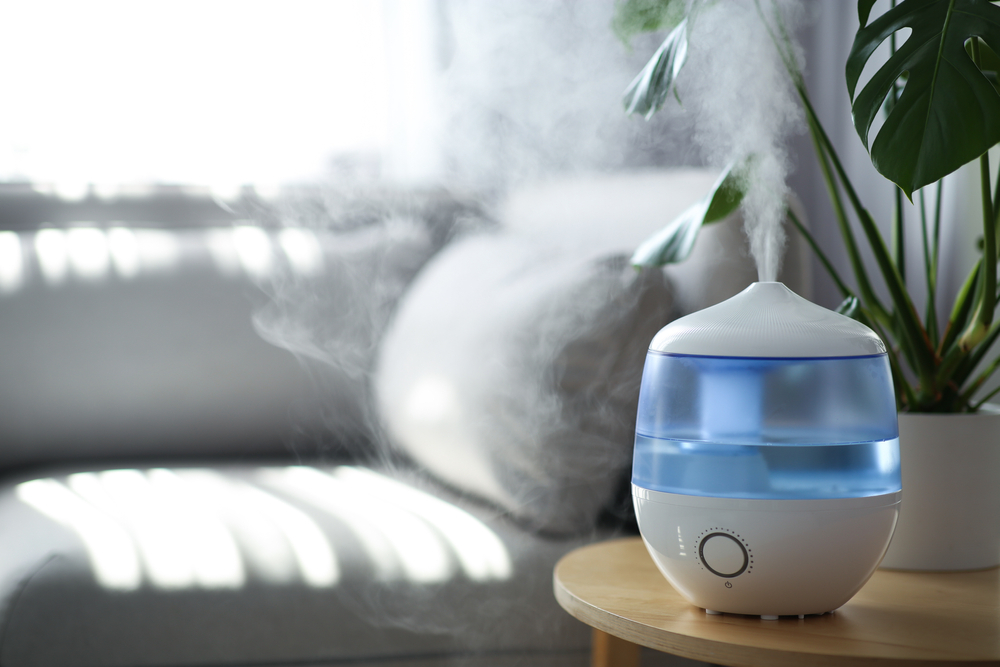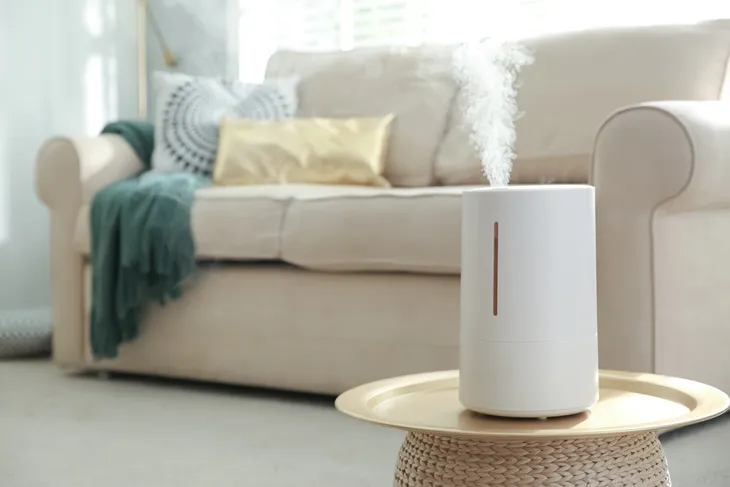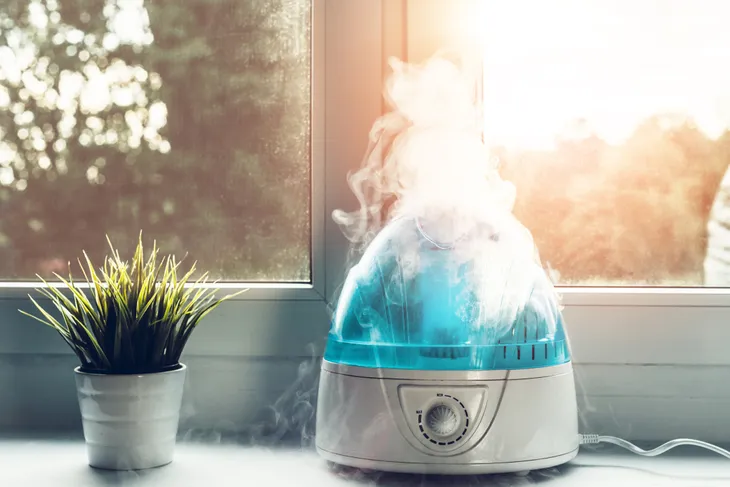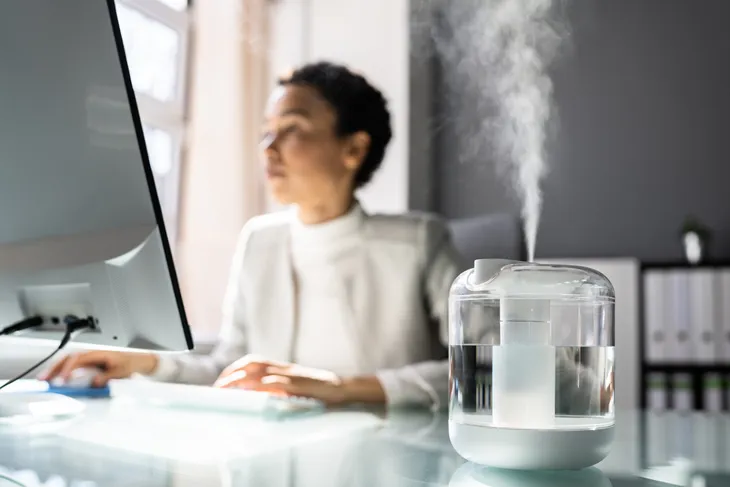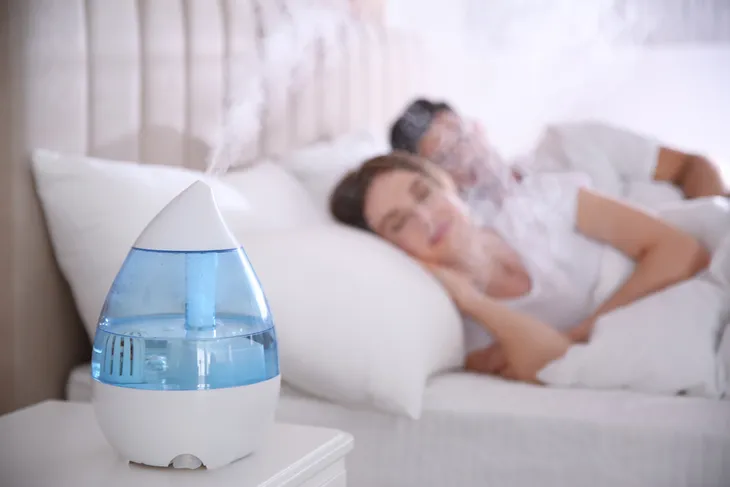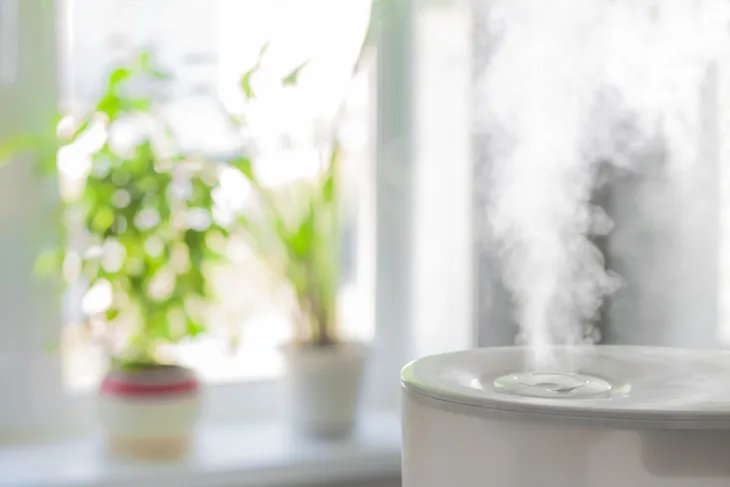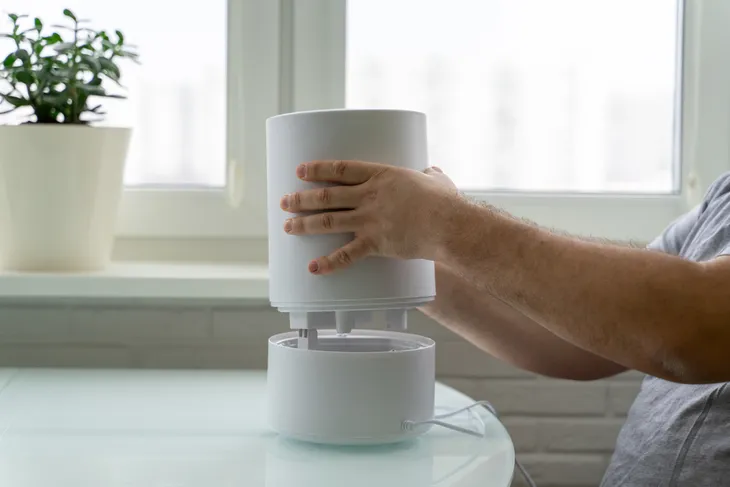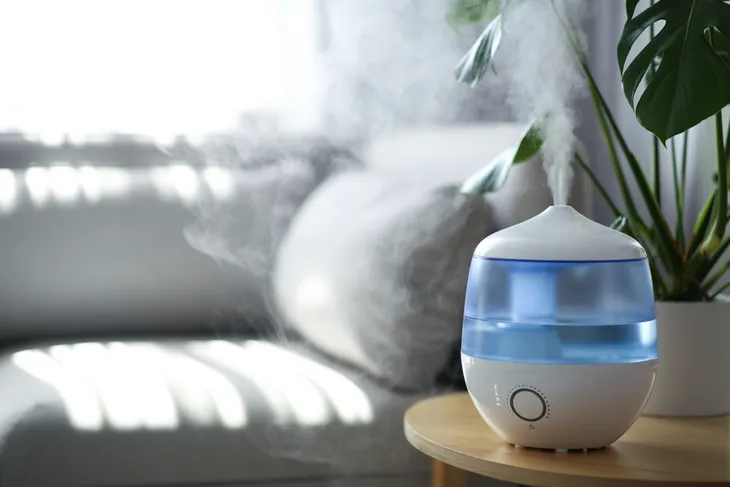- An air humidifier is an electrical appliance designed to increase humidity in a single room or an entire building.
- The ideal level of humidity for any one room hovers somewhere between 30 to 40-percent in the winter without causing condensation and around 50 to 60-percent in the summer.
- There are many benefits to using a humidifier from improved snoring and less static electricity to improved allergy symptoms and a less habitable environment for those pesky airborne diseases.
You’d be hard-pressed to find a TV sick-in-bed scene without a humidifier pictured filling the background with a cloud of mist. More and more though, the public is waking up to the benefits of air humidifiers and breathing easier as a result.
Living or working in an environment with consistently dry air is an avoidable distraction that most of us just sort of deal with. Our mission today is to fan away the fog surrounding air humidifiers and shine a light on the incredible benefits of owning one.
What Is a Humidifier?
An air humidifier is an electrical appliance designed to increase humidity in a single room or an entire building. They come in a lot of shapes and sizes and offer a variety of practical applications.
The main purpose of an air humidifier is to combat dryness and increase comfortability. Humidifiers are used in the home but are also leaned on to beat back the effects of dry air in hospitals and businesses.
When to Use a Humidifier
Every room is different, as is every person’s tolerance for dry air. But more generally, the ideal level of humidity for any one room hovers somewhere between 30 to 40-percent in the wintertime without causing condensation and around 50 to 60-percent in the summertime.
Humidity levels that dip below those points in those seasons can cause discomfort. Particularly in the wintertime when artificial heaters enjoy their largest workload. As essential as a heater in the middle of January can be, it greatly contributes to the dryness of the air.
Types of Humidifiers
Shopping for a new humidifier for your home can get a little overwhelming. There are just so many choices! Their differences are easily understood though.
Warm-mist humidifier: This type relies on an internal heating element to boil water before releasing it into the air.
Ultrasonic humidifier: These use vibrations created by imperceptible sound to create both hot and cold mist.
Ultraviolet humidifier: this type may rely on one of the methods above with an additional UV component added to destroy the germs in the water.
Cool-mist humidifier: Easily the most affordable and readily available. This type uses a motor to create cool vapor and distribute it into the air.
Odds are you’ll end up with a cool-mist humidifier. At least initially. But once you start using and reaping the many benefits of owning one you may deem it appropriate to invest in something a little more technologically advanced.
Benefit: Moist Hair and Skin
Dry air doesn’t just impact the air that you breathe. Spending too much time in a dry environment can wreak havoc on your skin and hair.
Dealing with chapped lips, flaky skin, and an itchy scalp is a real pain. But, gratefully, all of them can be prevented with a clean, working humidifier. To reap the benefits, keep the humidifier running in your living space during the day, and at night you may want to consider placing the humidifier next to your bed.
Benefit: Helps Prevent Spread of Airborne Viruses
There’s a lot of evidence to suggest the overwhelming benefits of owning and using a humidifier during flu season. This study found that adding the influenza virus to the air of a room with humidity levels of about 40-percent saw a rapid deactivation of the virus particles when compared to a drier room.
As it turns out, humidity plays a huge role in the way airborne viruses are spread around the air of an indoor space. This study suggests that it may even make surfaces more sanitary too.
Benefit: Helps Reduce Snoring
We aren’t here to tell you that a $100 device can outright eliminate snoring altogether. We wish. It may help improve or reduce existing symptoms though.
When the air in your bedroom is dry, your airways become constricted which can limit your ability to inhale properly and increase the vibration of throat tissues and congestion. When you use a humidifier, it can intensify moisture in the air and in turn, potentially help reduce snoring.
Benefit: May Improve Allergy Symptoms
There seems to be some confusion surrounding the impact of humidifiers on allergies. Older models used to add too much moisture to the air which encouraged the spread of dust mites. Humidifiers that aren’t clean can worsen allergies too.
But provided you clean your humidifier regularly and use one that’s been built in the last decade, you should experience a noticeable improvement in your allergy symptoms. Proper humidity levels help soothe the tissues of the throat and the nasal passages making symptoms easier to handle.
Benefit: Prevents Static Electricity
Winter months bring about drier air indoors, and drier air often causes an accumulation of static electricity. Not only does static electricity wreak havoc on your hair, but too much of it can also harm the electronics you keep around your home.
Static electricity may create sparks that could interact with whatever flammable liquids or gasses you have lying around too. To prevent static electricity, consider running a humidifier until your home reaches optimal humidity levels.
Benefit: Better Sleep
There are a lot of things that go into waking up feeling rested. Avoiding caffeine, alcohol, and late-night snacks is a good idea. Outfitting your bed with comfy blankets, sheets, and pillows works too.
Running the bedroom humidifier overnight can help make you more comfortable too. Dry air can lead to coughing and scratchy throats that may prevent you from falling asleep or wake you in the night. Humidifiers create comforting white noise too.
Potential Risks
Each humidifier type presents different sorts of risks. Those that use heat to boil and distribute water into the air present a burn risk. Not using distilled water can not only damage your humidifier but may also lead to an increase in bacteria in the air that you breathe.
The primary humidifier-related risk though relates to sanitation or lack thereof. Unclean humidifiers can cause bacterial growth that, when distributed into the air, may lead to coughing and colds. Which again is why keeping your humidifier clean is so critical.
Cleaning Tips
Don’t let the last few paragraphs scare you away from getting a humidifier. Sure, running a dirty humidifier can get dicey but cleaning one is actually pretty easy.
All you need to do is soak the base with a little bit of white vinegar for an hour or so and use some more to slosh around the inside of the reservoir. The goal is to eliminate any grease-like film that may have accumulated on the walls. Don’t forget to empty the vinegar through the nozzle of the humidifier so that it can clean the inside of that too.
The Takeaway
See? Humidifiers really aren’t as confusing or scary as some might have you believe. Keep them on, and clean them regularly, to soak up all of their incredible benefits all year long. From improved snoring and less static electricity to improved allergy symptoms and a less habitable environment for those pesky airborne diseases.
The good news is air humidifiers don’t have to be expensive either. They’re also widely available both in-store and online. Although, it’s important to do your research to find the best humidifier for you and your home.
